History in Focus: Elizabeth I and James VI and I | about | home | Elizabeth and James I
| |
||||||||||||||||||||
| Books |
||||||||||||||||||||
|
History On-Line provides bibliographic information on books and journal articles published by UK academic publishers. The details below represents a selection of books on the history of war in History On-line Try History On-line for additional information.
In this major biography of the queen, Wallace MacCaffrey focusses on Elizabeth's career as a practising politician, taking into account her testing personal experience, her temperament, her own view of her role and the constraints she frequently faced whether imposed by the inheritance from her predecessors or by contemporary events. The Elizabeth who emerges from these pages has a more human appearance than the stiff, richly garbed, bejewelled Elizabeth of the royal portraits. She is more fallible. And more interesting. Paperback - ISBN: 0340614552 - $16.99 - April 1994 - 496pp.
Authority and Consent in Tudor England:
Essays Presented to C.S.L. Davies Brought together as a tribute to the distinguished Tudor historian C.S.L. Davies, the essays in this collection address key themes in the current historiography of the Tudor period. These include the nature, causes and consequences of change in English government, society and religion, the relationship of centre, localities and peripheral areas in the Tudor state, the regulation of belief and conduct, and the dynamics of England's relations with her neighbours. The contributors, colleagues and students of Cliff Davies, are all leading scholars who have provided fresh and interesting essays reflecting the wide ranging inquisitiveness characteristic of his own work. They seek to cross as he has done the traditional boundaries between the medieval and early modern periods and between social, political and religious history. A coherent collection in their own right, these essays, by showing the many new directions open to those studying the Tudor period, provide a fitting tribute to such an influential scholar. Hardback - ISBN: 0 7546 0665 1 - September 2002 - £47.50 - 312 pp. King James VI and I: Selected Writings "Yet hath it been ever esteemed a matter commendable to collect [works] together, and incorporate them into one body, that we may behold at once, what divers Off-springs have proceeded from one braine." This observation from the Bishop of Winchester in his preface to King James's 1616 Workes is particularly appropriate, since James's writings cross the boundaries of so many different fields. While several other monarchs engaged in literary composition, King James VI and I stands out as "an inveterate scribbler" and is certainly the most extensively published of all British rulers.This volume provides a broad representative selection of King James's writings on a range of secular and religious topics. Each text is provided in full, creating an invaluable reference tool for 16th and 17th century scholars working in different disciplines and a fascinating collection for students and general readers interested in early modern history and literature. In contrast to other editions of James's writings, which have been confined to a single aspect of his work, the present edition brings together for the first time his poetry and his religious writing, his political works and his treatises on witchcraft and tobacco, in a single volume.What makes this collection of James's writings especially significant is the distinctiveness of his position as both writer and ruler, an author of incontestable authority. All his authorly roles, as poet, polemicist, theologian, political theorist and political orator are informed by this fact. James's writings were also inevitably influenced by the circumstances of his reigns and this volume reflects the turbulent issues of religion, politics and nationhood that troubled his three kingdoms. Hardback - 0 7546 0482 9 - April 2003 - c. £45.00 - c. 370 pp.
The Birth of the Elizabethan Age
England in the 1560s "Norman Jones has really brought the age and its people fully to life, approaching them from all conceivable angles and in every aspect of their lives, private and public. For once we really live with the generality of Englishmen and women. At the same time, the role and actions of the ruling sort are not left out: everything is most convincingly knit together. This is a major achievement, and I especially admired the way in which the author managed to instil in the reader the joy he had in putting this book together." Sir Geoffrey Elton, Clare College, Cambridge This is the first of a new series of books that will tell the history of early modern England from the perspective of those living at the time. Norman Jones' fascinating account details both the individual preoccupations (such as illness and famine) and the larger historical changes (such as fears over the succession and the establishment of Protestantism) which dominated life during the 1560s. Paperback - ISBN: 0631199322 - September 1995 Elizabeth
I and the Verdicts of History Archbishop Matthew Parker feared that Elizabeth would be 'strangely chronicled'. From her death to the screening of the film 'Elizabeth', the life of 'Gloriana' has been a subject for all kinds of imaginative fiction. History, too, has traded as much in myth as fact. Elizabeth's first historian, William Camden, was not responsible for the myth, although his translators were. The nineteenth century invented a 'whiggish' Elizabeth who identified herself with the destiny of her people, although the leading Tudor historian, A. J. Froude, was not a fan. Post-J. E. Neale and A. L. Rowse, Froude's critical interrogation of the reign has been revived in the latest Elizabethan historiography. Historical Research, vol. 76, no. 194 (forthcoming November 2003)
Unique, fascinating and revealing insight into the personality of Elizabeth through study of her papers. Paperback - ISBN: 0 85115 633 9 - £17.99 - 1999 - 276 pp. Tyrone's
Rebellion: the Outbreak of the Nine Years War in Tudor Ireland The insurrection in Ireland between 1594 and 1603 is examined and identified as the single greatest threat to Elizabeth's reign Paperback - ISBN: 0 85115 683 5 - £16.99 - 264 pp.
This book describes preaching at the royal
courts during the reigns of Elizabeth I and James I (1558-1625)
and reconstructs the contexts - architectural, religious, political
- in which the sermons were preached. The book is accompanied by
a definitive calendar on diskette of court sermons for the period. Hardback - ISBN: 0 521 59046 9 - £45
- 256 pp. Prayer
Book and People in Elizabethan and Early Stuart England '… a remarkable book … the force
of [Dr Maltby's] argument is inescapable. No historian of the Reformation,
of the rise of Anglicanism, or of popular religion in the localities,
can afford to neglect her work.' John Guy, The
Church Times Hardback - ISBN: 0 521 45313 5 - £50 - 331pp The
Early Elizabethan Polity: William Cecil and the British Succession
Crisis, 1558-1569 Traditionally historians have argued
that the court of Elizabeth I (1558-1603) was factional, divided
between competing subjects who were manipulated by their Queen.
This revisionary account provides a different interpretation:
of councillors who were united by two connected dangers, namely
Catholic opposition to Protestant England and Elizabeth's refusal
to marry or to settle England's succession. Hardback - ISBN: 0 521 62218 2 - £47.50 - 286 pp. The
Polarisation of Elizabethan Politics: the Political Career of
Robert Devereux, 2nd Earl of Essex, 1585-1597 The Earl of Essex was the last great
favourite of Elizabeth I. Using an unparalleled range of sources,
this revisionist study presents a new picture of Essex and of
the outbreak of faction in Elizabethan politics. Hardback - ISBN: 0 521 43485 8 - £55
- 468 pp.
Leicester and Court: Essays on Elizabethan
Politics During the past twenty-five years Elizabethan history has been transformed by the work of Simon Adams. Famous for the unique depth and breadth of his research in libraries and archives throughout Britain, Western Europe and the USA, he has brought to life the most enigmatic of the greater Elizabethans: Robert Dudley, Earl of Leicester. Together with his edition of Leicester's accounts and his reconstruction of Leicester's papers, Adams has published numerous essays and articles on Leicester's influence and activities. They have reshaped our knowledge of Elizabeth and her Court, Parliament, the localities from Wales to Warwickshire and such subjects of recent debate as the power of the nobility and the noble affinity, the politics of faction and the role of patronage. Sixteen of Adams' most important essays are found in this collection, organised into three groups: the Court, Leicester and his affinity, and Leicester and the regions. The collection ranges from much-cited essays in standard textbooks to papers at international conferences, as well as articles in a variety of journals. This volume will be essential reading for students and academics of the Elizabethan period and early modern history, as well as general enthusiasts interested in the reign of Elizabeth I. Paperback - ISBN: 0719053250 - April 2002 - £19.99 - 432pp. Theatre and Empire: Great Britain
on the London Stages under James VI and I Theatre and empire looks at the genesis of the British national identity in the reign of King James VI and I. While devolution is currently decentralising Britain, this book examines how the idea of a united kingdom was created in the first place. It does this by studying both the political language of the King's project to replace England, Scotland and Wales with a single kingdom of Great Britain and the cultural representations of empire on the public and private stages. The book argues that between 1603-1625 a group of playwrights celebrated a new national consciousness in works as diverse as Middleton's Hengist, King of Kent, Rowley's The Birth of Merlin and Shakespeare's Cymbeline. While specifically Jacobean interdisciplinary studies are few compared with Elizabethan and Caroline works, Marshall attempts to redress the balance by offering a fresh appraisal of James Stuart's reign. By looking at both established and little known plays and playwrights Theatre and empire rewrites our understanding of the political and cultural context of the Jacobean stage. Theatre and empire will be of interest to both historians and literary scholars of the period. Hardback - ISBN: 0719057485 - August 2000 - £47.50 - 224pp.
James I: The Masque of Monarchy This is the third title in the prestigious new English Monarchs series from the National Archives where England's royal leaders are introduced through conptemporary historical documents. Each volume contains a narrartive history of the reign illustrated through state papers, personal correspondence and other historical documents created at the time and now preserved mainly at the National Archives. Few monarchs have ascended the English throne amid as much eulogy and rejoicing as James I when he came to his English Kingdom in 1603. There was good reason for it. James brought a ready-made, legitimate dynasty to a nation which had spent much of the previous century agonising about the succession. The eulogies continued throughout his reign and after his death. However for every line of flattery there was also one of malicious gossip and this mixture has made his reign very difficult to evaluate fairly. The popular view of James today is likely to be negative, focused on his personal habits such as his stutter, his extravagant spending and his demonstrative homosexual behaviour, rather than his competence as King. This book looks beneath the flattery and above the gossip by going back to the first hand evidence: original papers and letters held at the National Archives. A lively narrative sets this unique material in context and provides a fresh, balanced survey of England's first Stuart King. Historical documents include: Shakespeare and his company at James'
coronation procession Paperback - ISBN: 1903365562 - October 2003- £14.99 Elizabeth I: The Golden Reign of Gloriana This is the launch title in a prestigious new series introducing England's royal heritage through the very stuff of history itself: priceless original papers, letters and other documents, mostly held at the National Archives. Offering a fresh perspective on the immensely popular area of Tudor history, this first title deals with the reign of Elizabeth I, perhaps England's greatest monarch. Sixteenth-century documents, many in Elizabeth's own hand, are reproduced in full colour, sometimes for the first time. Items are included which cover all aspects of her long and eventful reign, from her relationshsips with key members of her court and the problematic Mary Queen of Scots to the legendary victory in 1588 against the Spanish Armada. Each key document is beautifully reproduced in a double-page spread which also includes an extended contextualising caption and a modern transcription where necessary. The original sources are woven together by a brief narrative history of the reign, fully illustrated in colour with portraits, photographs and other material from the archives. Historical documents include: Elizabeth's first speech as Queen, 20 November 1558 Paperback - ISBN: 1903365430 - March 2003 - £14.99
Elizabeth I: The Competition for
Representation Elizabeth I is perhaps the most visible woman in early modern Europe, yet little attention has been paid to what she said about the difficulties of constructing her power in a patriarchal society. Elizabeth I: The Competition for Representation examines her struggle for authority through the representation of her female body. Frye's method is to provide historical accounts of three representational crises spaced fifteen years apart: the London coronation entry of 1559, the Kenilworth entertainments of 1575, and the publication of The Faerie Queene in 1590. In ways which varied with social class and historical circumstance, the London merchants, the members of the Protestant faction, courtly artists and artful courtiers all sought to stabilize their own gendered identities by constructing the queen within the 'natural' definitions of feminine as passive and weak. Elizabeth fought back, acting as a discursive agent by crossing and then disrupting these definitions. She and those closely identified with her interests evolved a number of strategies through which to express her control of the government as the ownership of her body, including her elaborate iconography and a mythic biography upon which most accounts of Elizabeth's life have been based. The more authoritative her image became, the more violently it was contested in a process which this book examines and consciously perpetuates. This perceptive and innovative study of one of the most visible and powerful women in European history offers an unusual focus: Queen Elizabeth I's difficulty in constructing her power in a patriarchal society. Through the examination of three crises of allegorical representation in her reign this study traces by literary and historical means the queen's struggle to retain control over the iconography of both her physical self and her political domain. `impressively researched ... a book with many good things in it, and the introduction especially is a lucid critique of and response to work in the field' - Times Literary Supplement England's
Elizabeth: an Afterlife in Fame and Fantasy No monarch is more glamorous or more controversial than Elizabeth I. The stories by which successive generations have sought to extol, explain, or excoriate Elizabeth supply a rich index to the cultural history of English nationalism - whether they represent her as Anne Boleyn's suffering orphan or as the implacable nemesis of Mary, Queen of Scots, as learned stateswoman or as frustrated lover, persecuted princess or triumphant warrior queen. This book examines the many afterlives the Virgin Queen has lived in drama, poetry, fiction, painting, propaganda, and the cinema over the four centuries since her death, from the aspiringly epic to the frankly kitsch. Exploring the Elizabeths of Shakespeare and Spenser, of Sophia Lee and Sir Walter Scott, of Bette Davis and of Glenda Jackson, of Shakespeare in Love and Blackadder II, this is a lively, lavishly-illustrated investigation of England's perennial fascination with a queen who is still engaged in a posthumous progress through the collective pysche of her country. '... the pictures wonderfully illustrate her incarnations. England's Elizabeth dazzles.' - The Independent magazine 'Their book is an excellent example of a distinctly modern (indeed post modern) genre of biographical writing Dobson and Watson are balanced and incisive Jonathan Bate' - The Sunday Telegraph Hardback - ISBN: 0 198183 77 1 - November 2002 - £19.99 - 360 pp.
'This is an excellent book which students will find clear and helpful. It copes well with the familiar dilemma of military history, dealing with the realities of combat but never losing sight of their wider social, political and diplomatic contexts.' - Steven Gunn, Merton College, Oxford The human and financial cost of war between 1544 and 1604 strained English government and society to their limits. Paul E. J. Hammer offers a new narrative of these wars which weaves together developments on land and sea. Combining original work and a synthesis of existing research, Hammer explores how the government of Elizabeth I overhauled English strategy and weapons to create forces capable of confronting the might of Habsburg Spain. Hardback - ISBN: 0333919424 - July 2003 -£47.50 - 344 pp.
[Rowse] was an extraordinary pioneer.' - David Starkey 'Rowse's study is by far the best of Elizabethan Society.' - New Statesman 'The most attractive and the greatest age of England portrayed in detail as it actually was.' - Sunday Times 'I am above all glad that the most attractive and the greatest age of England should be portrayed in detail as it actually was, with shrewd but sympathetic comment.' - G.M. Trevelyan, Sunday Times 'Mr Rowse's study is by far the best, the most scholarly account, of Elizabethan Society.' - H.R. Trevor-Roper, New Statesman The Elizabethan Age is arguably that greatest in English history. Furthermore it is not something dead and apart from us: it is alive and all around us. England contains the visible memorials of Elizabethan society: the houses they built; the objects they cherished; the patterns they imposed upon the very landscape. Rowse's classic study is a detailed account of that society and tradition from the lowest social class to the men and women who governed the realm. This reissue of Rowse's famously vivid portrayal of the Elizabethan world is complemented by a major introduction from Christopher Haigh which offers both a reflection on Rowse's masterpiece and an assessment of the Elizabethan Age. Paperback - ISBN: 1403908125 - March 2003 - £17.99 - 632 pp.
'Dr Rowse has created a masterpiece on a great subject.' - The Times Literary Supplement 'One of the major works of historical literature to appear in our time.' - The New Statesman '. . . Rowse's second volume of his The Elizabethan Age brilliantly fulfils the high promise of its predecessor.' - The Economist Elizabethan society is arguably the most successful in English history. The adventurers and merchants (as well as the poets and playwrights) of that age are legendary. The subject of this classic study by A.L. Rowse is that society's 'expansion'. Elizabethan society expanded both physically (first into Cornwall, then Ireland, then across the oceans to first contact with Russian, the Canadian North and then the opening up of trade with India and the Far East) and in terms of ideas and influence on international affairs. Rowse argues that in the Elizabethan age we see the beginning of England's huge impact upon the world. Paperback - ISBN: 1403908133 - April 2003 - £17.99 - 472 pp.
'This is an excellent collection. All the
essays are very strong and many are by noted scholars. This book
will find a wide readership.' - Carole Levin, University of Nebraska-Lincoln 'A splendid and useful collection.' - Professor Diarmaid MacCulloch, Oxford University Elizabeth I is one of England's most admired and celebrated rulers. She is also one of its most iconic. This wide-ranging interdisciplinary collection of essays examines the origins and development of the image and myths that came to surround the Virgin Queen. The essays question the prevailing assumptions about the mythic Elizabeth and challenge the view that she was unanimously celebrated in the literature and portraiture of the early modern era. They explain how the most familiar myths surrounding the queen developed from the concerns of her contemporaries and continue to reverberate today. Published to mark the 400th anniversary of the queen's death, this volume will appeal to all those with an interest in the historiography of Elizabeth's reign and Elizabethan, and Jacobean, poets and dramatists. Paperback - ISBN: 0333930843 - February 2003 - £15.99 - 280 pp.
Surveying four-hundred years of British history, Walker examines how the memory - the icon - of Queen Elizabeth has been used as a marker for Englishness in disputes political and social, in art, literature and popular culture. From her second Westminster tomb to the pseudo-secret histories of the Restoration, from Georgian ballads to Victorian paintings, biographies, children's books, Suffragette banners, novels and films, trends in scholarship and rubber bath ducks, the icon becomes more powerful as the idea of Englishness becomes more arbitrary. Hardback - ISBN:1403911991 - Forthcoming November 2003 - £25 - 256 pp.
'A concise guide to Elizabeth's life, Levin's book describes the Queen's complex web of alliances and personages, without losing the reader. The Reign of Elizabeth is recommended reading for anyone interested in a "user-friendly" look at England's most famous queen.' - Renaissance Magazine '...a brief, well-written overview of Elizabeth's political, religious and cultural significance.' - Publisher's Weekly The reign of Elizabeth I was marked by political, religious and social change. Carole Levin evaluates Elizabeth and the significance of her reign both in the context of her age and our own, examining the increasing cultural diversity of Elizabethan England and the impact of the reign of an unmarried queen on gender expectations, as well as exploring the more traditional themes of religion, foreign policy, plots and conspiracies. Paperback - ISBN:0333658655 - October 2001 - £14.99 - 160 pp.
Patronage, Culture and Power: the
Early Cecils, 1558-1612 The Cecils were the dominant noble family in Elizabethan and Jacobean England. William, Lord Burghley rose to power and great wealth under Elizabeth I, then used his extensive patronage and exceptional breadth of interests to advance the Cecils' remarkable political and cultural pre-eminence. This wide-ranging collection of essays draws on architectural and art history, court studies, English literature, garden history, musicology, economic history, and women's studies. The extensive building programme of William, Lord Burghley and his son Robert, Earl of Salisbury was the most spectacular of the 16th and early 17th centuries, and much of it, particularly Burghley House and Hatfield House, still survives. Their encouragement of new processes of manufacturing was, like their splendid houses, innovative, forward-looking and highly influential. The Cecils were also innovative patrons of the arts. They were pioneers in the vogue for collecting paintings; patrons of musicians such as John Dowland and writers such as Ben Jonson; and introduced new styles of Renaissance design into gardens and interiors. The Cecil women, too, were influential in both political and cultural spheres. The notable character of Mildred, Lord Burghley's wife, and the marriage alliances and female courtiership of the Cecil daughters are some of the themes explored in this refreshingly inter-disciplinary collection of essays. Hardback - ISBN: 0300091362 - January 2002 - £40.00/$65.00 - 306 pp. Sir Francis Drake: the Queen's Pirate In this lively and engaging new biography, Harry Kelsey shatters the familiar image of Sir Francis Drake. The Drake of legend was a pious, brave, and just seaman who initiated the move to make England a great naval power and whose acts of piracy against his country's enemies earned him a knighthood for patriotism. Kelsey paints a different and far more interesting picture of Drake as an amoral privateer at least as interested in lining his pockets with Spanish booty as in forwarding the political goals of his country, a man who became a captain general of the English navy, but never waged traditional warfare with any success. Drawing on much new evidence, Kelsey describes Drake's early life as the son of a poor family in sixteenth-century England. He explains how Drake dabbled in piracy, gained modest success as a merchant, and then took advantage of the hostility between Spain and England to embark on a series of daring pirate raids on undefended Spanish ships and ports, preempting Spanish demands for punishment by sharing much of his booty with the Queen and her councillors. Elizabeth I liked Drake because he was a charming rogue, and she made him an integral part of her war plans against Spain and its armada, but she quickly learned not to trust him with an important command: he was unable to handle a large fleet, was suspicious almost to the point of paranoia, and had no understanding of personal loyalty. For Drake, the mark of success was to amass great wealth - preferably by taking it from someone else - and the primary purpose of warfare was to afford him the opportunity to accomplish this. Hardback - ISBN: 0300071825 - October 1998 - £22.50 - 592 pp. |
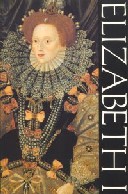 Elizabeth
I
Elizabeth
I 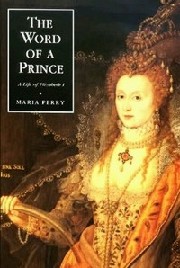 The
Word of a Prince: a Life of Elizabeth I from Contemporary Documents
The
Word of a Prince: a Life of Elizabeth I from Contemporary Documents Sermons
at Court: Politics and Religion in Elizabethan and Jacobean
Preaching
Sermons
at Court: Politics and Religion in Elizabethan and Jacobean
Preaching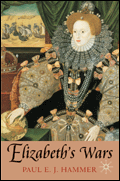 Elizabeth's
Wars: War, Government and Society in Tudor England, 1544-1604
Elizabeth's
Wars: War, Government and Society in Tudor England, 1544-1604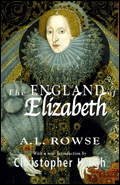 The
England of Elizabeth: the Structure of Society
The
England of Elizabeth: the Structure of Society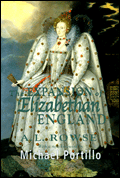 The
Expansion of Elizabethan England
The
Expansion of Elizabethan England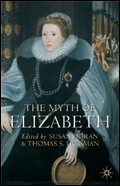
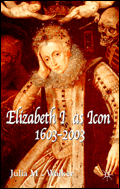 Elizabeth
I as Icon, 1603 to 2003
Elizabeth
I as Icon, 1603 to 2003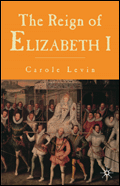 The
Reign Of Elizabeth I
The
Reign Of Elizabeth I